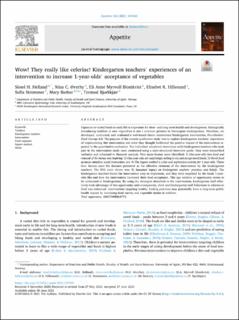Wow! They really like celeriac! Kindergarten teachers' experiences of an intervention to increase 1-year-olds' acceptance of vegetables
Helland, Sissel Heidi; Øverby, Nina Cecilie; Blomkvist, Eli Anne Myrvoll; Hillesund, Elisabet Rudjord; Strømmer, Sofia; Barker, Mary Elizabeth; Bjørkkjær, Tormod
Peer reviewed, Journal article
Published version
Permanent lenke
https://hdl.handle.net/11250/2988250Utgivelsesdato
2021Metadata
Vis full innførselSamlinger
Originalversjon
Helland, S. H. Øverby, N. C. Blomkvist, E. A. M. Hillesund, E. R. Strømmer, S. Barker, M. E. Bjørkkjær, T. Wow! They really like celeriac! Kindergarten teachers' experiences of an intervention to increase 1-year-olds' acceptance of vegetables Appetite. 2021, 166 . https://doi.org/10.1016/j.appet.2021.105581Sammendrag
Abstract
Exposure to varied foods in early life is important for short- and long-term health and development. Strategically introducing toddlers to new vegetables is not a common practice in Norwegian kindergartens. Therefore, we developed, conducted, and evaluated a web-based cluster randomised kindergarten intervention, Pre-schoolers’ Food Courage 2.0. The purpose of the current qualitative study was to explore kindergarten teachers' experience of implementing this intervention and what they thought facilitated the positive impact of the intervention reported in the quantitative evaluation. Ten individual telephonic interviews with kindergarten teachers who took part in the intervention study were conducted using a semi-structured interview guide. Data were transcribed verbatim and subjected to thematic analysis. Five main themes were identified: 1) One-year-olds love food and renewal of the menus was inspiring; 2) One-year-olds are surprisingly willing to try and accept novel foods; 3) Novel food at meals stimulate social interaction; and 4) The Sapere method is a fun and explorative activity for 1-year-olds. These four themes were the features perceived as the effective elements of the intervention by the kindergarten teachers. The fifth main theme was: 5) Sustained impact on kindergarten teachers’ practices and beliefs. The kindergarten teachers found the intervention easy to implement, and they were surprised by the foods 1-year-olds like and how the intervention increased their food acceptance. This age window of opportunity seems to be underused in kindergartens. By using the strategies described in the intervention, kindergarten staff effectively took advantage of this opportunity and consequently, child and kindergarten staff behaviour in relation to food was enhanced. Interventions targeting healthy feeding practices may potentially have a long-term public health impact by increasing food variety and vegetable intake in toddlers.

